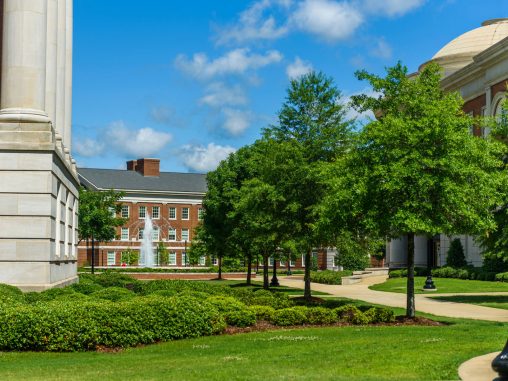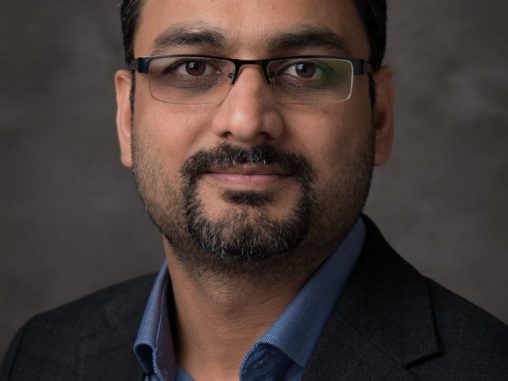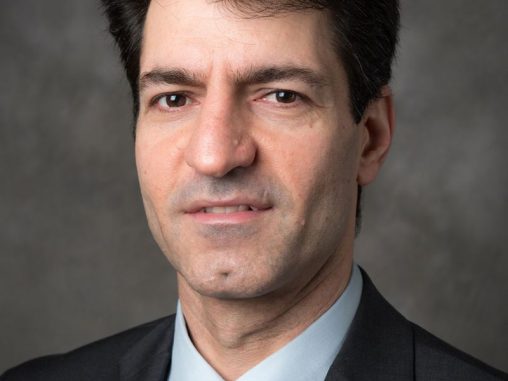Our research programs for graduate and undergraduate students provide an unmatched experience having access to state-of-the-art computational facilities and experimental capabilities.

Funding From President Biden’s Investing in America Agenda will Support Institutions Nationwide to Boost Training Opportunities for the Energy Workforce, While Lowering Costs for Small Businesses and Reducing Emissions

“Congratulations to each member of the Class of 2023 Associate Fellows,” said AIAA President Laura McGill. “This distinguished group of professionals has made significant and lasting contributions to the aerospace...

Dr. Nader Jalili, mechanical engineering department head and director of the Alabama Initiative on Manufacturing Development and Education, was recently presented the Michael J. Rabins Leadership Award by the American...

UA’s Department of Mechanical Engineering Faculty is grouped into three interconnected but distinct disciplinary groups; Dynamic Systems & Control (DSC), Materials Processing & Manufacturing (MPM), and ThermoFluids Science (TFS). Each of these Departmental Disciplinary Group (DDG) is further broken into horizontally interconnected “Research Thrust Areas (RTAs)”. Our diverse faculty conduct research in all of these areas while concentrating in a more specific discipline or area as follows:
The Department of Mechanical Engineering also directs four specialized research units:

Advanced and Intelligent Manufacturing Systems (AIMS) Laboratory – Dr. Nader Jalili
In this research laboratory, four main areas of research and education are pursued. 1) Dynamic Systems, Control, and Automation 2) Robotics and Artificial Intelligence for Manufacturing Systems 3) Future Manufacturing with Human Robot Teams and finally 4) Mechatronic and Manufacturing Systems Education.
Advanced Hierarchical Materials by Design (AdHiMaD) Laboratory – Dr. Kasra Momeni
The main area of research in the AdHiMaD lab expertise is developing theoretical/numerical tools to understand the multiscale/physics response of materials and designing experimental procedures to make superior materials. Various modeling techniques, including atomistic simulations, mesoscale phase-field approach, and macroscale continuum methods, along with experimental techniques such as in situ TEM and scanning probe microscopy, are utilized to achieve this goal.
The Control of Human and Robotic Systems (CHARS) Laboratory is rooted in both theory and application. From a theoretical perspective, Lyapunov- and passivity-based approaches are utilized to design and validate stabilizing adaptive controllers for nonlinear, switched, hybrid, and uncertain dynamical systems. Correspondingly, the laboratory applies the controllers to various applications including functional electrical stimulation, rehabilitation, robotics, exoskeletons, human-robot interaction, additive friction stir deposition, and many others.
Biomechanics Laboratory – This laboratory contains work space for design and construction of devices to aid in health maintenance. Computer facilities in the lab are equipped with software for both lumped-mass and finite element modeling of the human body.
Combustion and Reactive Flow Laboratory – This teaching and research laboratory contains a holographic interferometer, a high-speed imaging system, a laser-induced fluorescence system, and a particle image velocimetry system. The laboratory supports research on topics such as microgravity combustion, reactive turbulent flows, propulsion, and internal combustion engine applications.
Design Clinic Laboratory – This laboratory consists of a design library, conference space, audio/visual equipment, telephone centers, and a presentation area for Design Clinic Industrial Project activities.
Instrumentation Laboratories – These labs provide a variety of experimental equipment and instruments to support the teaching of basic instrumentation for mechanical systems and thermal fluid systems.
Machining Research Laboratory – This laboratory contains basic machine tools such as milling machines, lathes, drill presses, and a 10-hp CNC turning center. The laboratory supports research on machining areas (e.g. machining of advanced materials for process development, modeling, and optimization). The laboratory also supports teaching of introduction to manufacturing processes.
Metrology Laboratory – This laboratory contains metrology instruments, including a Leitz measuring microscope, a Brown & Sharpe Coordinate Measuring Machine, and other gages. The laboratory supports research on metrology-related issues in manufacturing such as precision and surface finish. The laboratory also supports teaching needs on fundamental metrology in manufacturing.
Numerical Modeling Laboratory – This laboratory features high-performance workstations with expanded storage and various I/O devices for efficient modeling of fluids and transport phenomena.
Robotics and Automation Laboratory – This laboratory supports instrumentation and research in the areas of robotics, imaging systems, computer-mechanical interfacing, control systems, and computer-integrated manufacturing.
Structural Acoustics Laboratory – Dr. Steve Shepard
Focus areas: to develop new technologies in the areas of structural vibrations and acoustics. By gaining a fundamental understanding of the generation, transmission and radiation mechanisms associated with sound and vibration, the needs of industry, government and engineering education can be met.

Speaker Invitation for Spring 2023 ME Seminar Series
| Date | Speaker | Title |
|---|---|---|
| 01/17/2023 | Dr. Nader Jalili and Dr. SteveShepard (University of Alabama) | Research Ethics and ME Research Overview |
| 01/24/2023 | Dr. Kam Leang (University of Utah) | Smart Electronic Nose in Flight |
| 01/31/2023 | Dr. Yongho Sohn (University of Central Florida) | Alloy Design and Development for Laser Powder Bed Fusion Additive Manufacturing |
| 02/16/2023 | Dr. Sen Liu (Stanford University) | AI-Powered Laser Additive Manufacturing and Energy Materials Design |
| 02/20/2023 | Dr. Ziyu Wang (Princeton University) | Towards Carbon Neutral Energy Future: Next Generation Fuelsand Novel High Pressure Combustion Technology |
| 02/21/2023 | Dr. Sadie Beck (The University of West Alabama) | Process-Structure-Property-Performance Relationships of Precipitate and Strain-Hardened Aluminum Alloys Processed via Additive Friction Stir Deposition |
| 02/23/2023 | Dr.Kumar Shanmugam (University of Glasgow, UK) | Multifunctional and Multiscale Materials Enabled by Additive Manufacturing and Nanoengineering |
| 02/27/2023 | Dr. Gowtham Mohan (University of New Mexico, Albuquerque) | Solar Energy Technology Lab |
| 03/03/2023 | Dr. Qiang Zhang (University of North Carolina) | Biological signals-driven neuromuscular system modelingand advanced nonlinear control/adaptive optimal control for wearable robotic assistive devices |
| 03/06/2023 | Dr. Rajavasanth Rajasegar | A Highlight of Recent Efforts in Low Greenhouse Gas Combustion Research at Sandia |
| 03/09/2023 | Dr. Fariborz Tavangarian (Penn State Harrisburg) | Achieving Resilience in Brittle Materials Through Bio-inspired Nested Cylindrical Structures |
| 04/18/2023 | Dr. Jean-CharlesStinville (University of Illinois, Urbana-Champaign) | A Statistical View of Deformation Events in Metallic Material |
| 04/28/2023 | Dr. Masoud Agah (Virginia Tech) | My Journey Through the Semiconductor and Chip World |